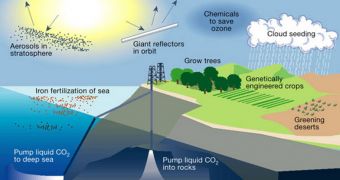As our planet becomes increasingly warmer, climate change poses a considerable number of threats to the Earth's population, shorelines, precipitations, arid lands, and so on. Mitigating the effects of global warming is only possible through a combined action taken by the world's leaders, but the officials seem unable or unwilling to make such a commitment, as evidenced at the last UN climate summit. Some scientists have proposed for a long time geoengineering schemes as a possible solution, but the debate on whether or not this is the way to go has been raging on ever since, LiveScience reports.
There are many people out there today who fear that the effects of global warming are already too furthered to stop. This means that they are focusing on mitigating them, through measures that are a little bit more direct and intensive than reducing greenhouse-gas emissions. Developed nations in principle accepted that the level of temperature increase should be kept below two degrees Celsius by 2100, as this would cause most of the ice caps to melt, and global sea levels to rise. Experts propose purposefully engineering the Earth's climate, in a way that would ensure this doesn't happen.
Academics have also stepped into the conflict, with many professors arguing for or against geoengineering. Critics to this approach believe that it is dangerous to, for example, fertilize the oceans with iron particles, or to place aerosols in the atmosphere, because there is no way of telling how this would affect the ecosystems, or influence the circulation of chemicals on Earth. On the other hand, proponents say that we are way past any point of no return, and that emphasis should be shifted from mitigation efforts – which are clearly not working – to actively counteracting these effects.
There is also a political dimension to this debate, in the sense that the international community risks even further fragmentation. In the hypothetical case that a country, or group of countries, decides to go ahead with geoengineering efforts, this may cause tensions between them and nations that do not want such schemes in place. Such dissensions could easily escalate to war, if we assume that they appear between nations that are not constrained in their action by fear of the others' arsenal and military capabilities.

 14 DAY TRIAL //
14 DAY TRIAL //